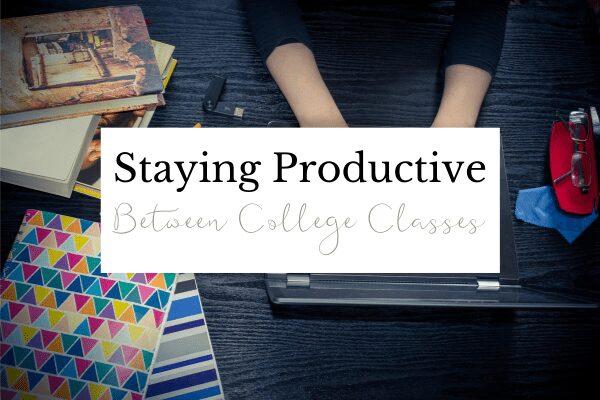College Classes – How to Stay Productive Between Them
Some of the links below are affiliate links, meaning, at no additional cost to you, I will earn a commission if you click through and make a purchase. See our full disclaimer here.
This post shows you how to stay productive between your college classes.

College classes can be pretty emotionally draining. You’re sitting and taking notes for a 50, 90, or even 180 minute course, usually with no breaks. This is a lot of mental exercise, and it can really wipe you out.
Between college classes, you’ll most likely have a break of an hour or two. This time period allows for you to recover a bit before your next class, but doesn’t allow enough time for you to go back to your home, unless for a quick stop.
Throughout my college career, I found that these little breaks between my classes were an absolute game changer when they were utilized correctly. I would review what I had learned in the class I just got finished with, and then jump start my assignments for the evening. By the time I got home, I had very little homework. This left so much time for activities I enjoyed, and helped me thrive in my college life.
In this post, I show you exactly how I stay productive in between my college classes. By staying productive, I’m able to complete assignments early, manage my time better, and stay on top of my grades.
Here are 12 tips to stay productive between your college classes.
TIPS FOR PRODUCTIVITY IN-BETWEEN COLLEGE CLASSES
REVIEW YOUR CLASS
Right after you finish a class, re-write any notes that need more clarification, fill out some flash cards, and take at least 15 minutes to review the concepts that you just learned. This allows you to get a leg up on concepts that you would have to spend more time studying later, which saves you quite a bit of time in the long run.
EAT A NUTRITIOUS SNACK
It’s tempting to chow down on unhealthy foods from a vending machine during your quick breaks, but take time to pack some healthy snacks. Your diet, sleep schedule, and exercise level makes an enormous difference in your productivity levels all around. Fuel up with some brain food between college classes to keep your energy levels up throughout the day.
ANSWER E-MAILS
Checking your email every morning is vital in college. Not only will you be sent information about class cancellations through this medium, but you will also be contacted by Teaching Assistants, Professors, or other classmates using your University email. Answering these emails in a professional and timely manner is a great habit to get into, and checking and answering your email between classes is a great way to stay on top of it.
RE-READ YOUR NOTES
Re-reading your notes is an easy way to get some low pressure studying in between college classes. All around, this helps you stay on top of your assignments and broadens your understandings of the class material in general. If you review your classes right after you finish them, and re-read your notes on a regular basis, you’ll feel little stress when preparing for exams.
PRACTICE FLASHCARDS
When I have a quick break between classes, maybe only 20 -30 minutes, I find that spending that time practicing flashcards helps keep my grades up. When I am reviewing after class, I take a few minutes to add any key concepts or definitions to my Quizlet account. I keep a file for each class, and then divide those files by how the class is divided, usually found in your syllabus schedule. Out of all the habits I’ve created in college, this is one of the most useful for saving time and acing my exams.
VISIT OFFICE HOURS
Creating a relationship between your professors and Teaching Assistants and yourself is important when it comes time to request letters of recommendation. Aside from answering questions and paying attention in class, visiting office hours is where you can really start a relationship with that professional. I like to visit office hours maybe once every two weeks, and I usually ask questions about upcoming large assignments.
REVIEW YOUR CLASS
Right after you finish a class, re-write any notes that need more clarification, fill out some flash cards, and take at least 15 minutes to review the concepts that you just learned. This allows you to get a leg up on concepts that you would have to spend more time studying later, which saves you quite a bit of time in the long run.
WORKOUT
Almost all Universities have a super decked out on-campus gym that is completely free for students. I did not utilize this perk until my second year of college, but I wish I had started sooner! Staying healthy in college is extremely important, and visiting the campus gym is a great way to stay in shape without taking up too much time.
SPEND TIME OUTSIDE
If your last class absolutely burned you out, take a nice walk outside around campus. However, make sure that you are staying safe and in populated areas. Taking some time to recharge outside is really helpful for your mental and physical health.
JUMP START A BIG ASSIGNMENT
Diving into a big project that you are dreading is a fantastic thing to do between college classes. I find that if I’m particularly dreading an assignment, telling myself to “just get a start” between college classes really helps. For some reason, looking at spending a little bit of time on a project seems a lot more achievable than sitting down to complete hours of work.
RUN QUICK ERRANDS
Running to pick up a prescription or grab some household essentials in-between classes is a fantastic use of time. I also find that when I have a time restriction, because I need to make it to my next class, I’m a lot less likely to wander around the store and buy way more than I need.
THROW IN SOME LAUNDRY
If you live on campus, or if your campus has washing machines available to all students, throwing in laundry and then heading to your next class is a great use of time. This is another task that I like to complete when I have a break that is less than an hour. Then, when my class is done, I can finish my laundry and take it home.
VISIT THE TUTORING OR WRITING CENTER
Just like the campus gym, the tutoring and writing centers were perks that I completely underutilized my Freshman year of college. If you’re struggling on an assignment or with writing a paper, see if your campus has a tutoring or writing center. Larger campuses even have walk-in tutoring, which is perfect for last-minute assistance.



